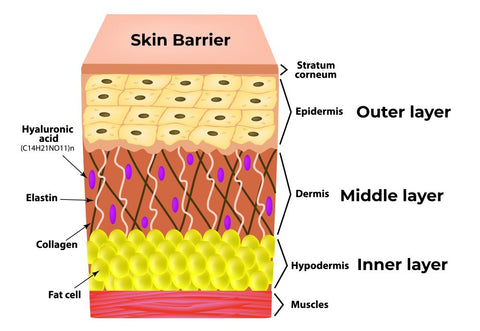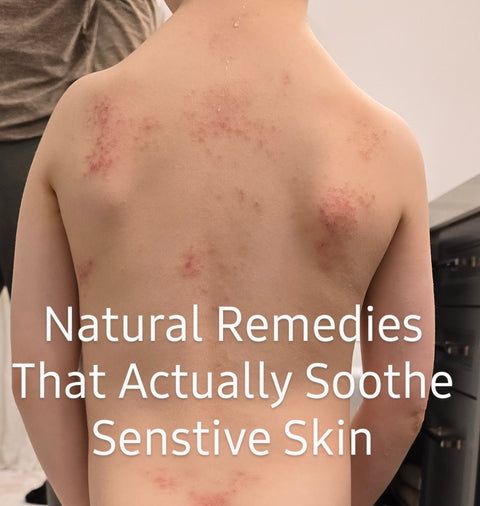How to Support Your Baby’s Skin Barrier (and Why It Matters)
You’ve probably been told to moisturize your baby’s skin or avoid fragrance, but do you know why? The answer lies in something most baby skincare routines don’t talk enough about: the skin barrier.
Think of the skin barrier like a wall. It keeps good things in (like hydration) and bad things out (like irritants, allergens, and bacteria). When it’s working well, skin stays soft, calm, and protected. But when that barrier is disrupted — from overwashing, dryness, harsh ingredients, or even gut and immune sensitivities — irritation and rashes can show up fast.
👶 Baby Skin Is Different
Newborn and infant skin is naturally more delicate. In fact:
- A baby’s skin barrier is 30% thinner than adult skin and more permeable, meaning it loses moisture faster and absorbs ingredients more easily. [source]
- Their skin pH (a key part of immunity and barrier strength) is still stabilizing during the first year of life. [source]
- Babies produce less natural oil, making their skin more vulnerable to dryness, friction, and inflammation.
This is why daily skincare choices—like your cleanser or balm—can make a big difference.
⚠️ What Can Damage a Baby’s Skin Barrier?
You don’t need to fear everything, but here are common baby skin stressors:
- Overwashing: Even water can strip away essential oils
- Fragrances and preservatives: Often found in mainstream wipes, creams and washes
- Heavy or occlusive creams: Ingredients like petroleum can trap bacteria and block airflow
- Excess moisture and friction: Especially in diaper areas and folds
When the skin barrier is compromised, it may show up as:
- Rough patches
- Dry or red skin
- Increased sensitivity or rashes
- Slow healing or frequent flare-ups

🌿 How to Support Baby’s Skin Barrier Daily
1. Use Gentle, pH-Balanced Cleansers
Avoid soaps with sulfates or artificial fragrance — they strip delicate skin.
2. Moisturize Regularly with Barrier-Supporting Ingredients
Look for products rich in fatty acids, plant oils, and vitamin E to restore and protect the skin barrier.
3. Apply a Breathable Barrier After Every Diaper Change
This locks in moisture and shields against irritants like urine and friction.
💚 Why We Created Mamou’s Baby Barrier Gel
We were tired of “natural” creams that didn’t work or used questionable ingredients. Mamou’s formula is:
- Made with organic oils like sunflower, apricot kernel, and castor
- Uses plant-based berry wax for a breathable, protective seal
- Contains vitamin E to help support barrier repair
- Free from petroleum, parabens, sulfates, and artificial fragrance
✔️ Safe enough for newborns
✔️ Strong enough for toddler rough patches
✔️ Gentle enough for daily use
✔️ Cloth diaper–friendly
It’s a simple, effective way to protect baby’s skin before issues arise and support healing when they do.
💡 Bottom Line
Your baby’s skin is more than just soft—it’s part of their developing immune system. Supporting their skin barrier isn’t complicated, but it does take intention.
With daily nourishment, breathable protection, and clean ingredients, you can help your little one’s skin stay healthy, strong, and rash-free.




